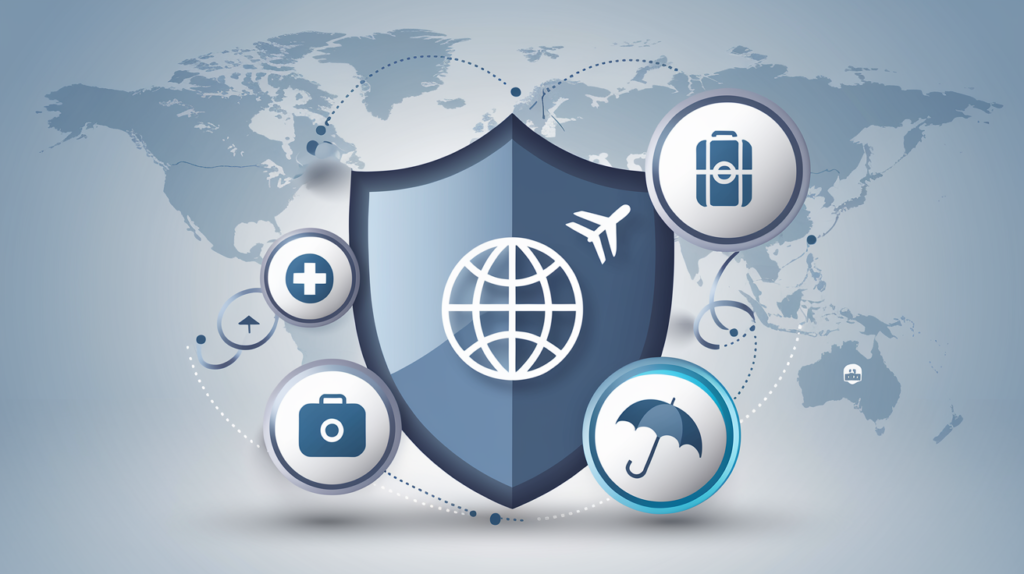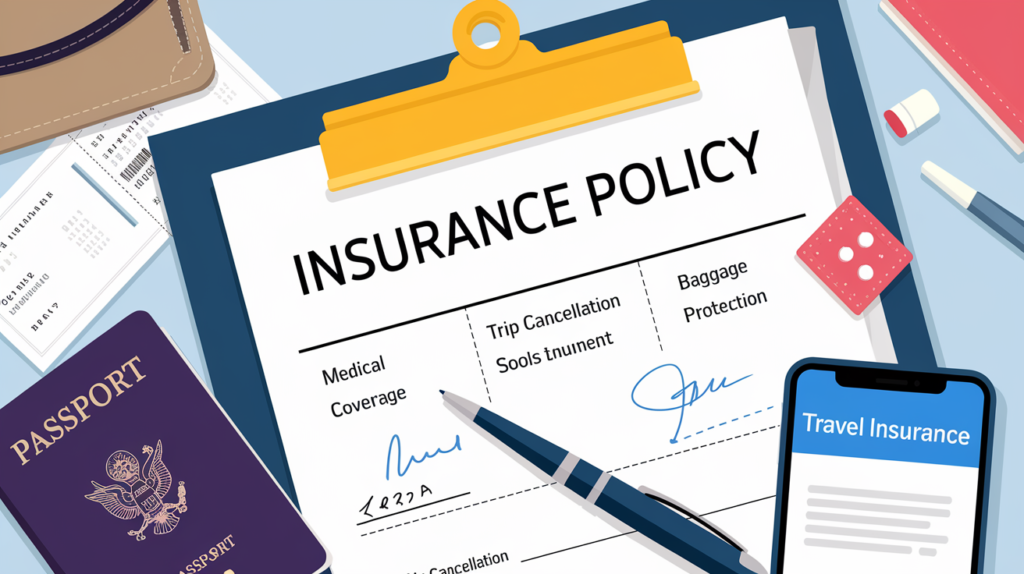Traveling is exciting, but it also comes with uncertainties that can disrupt your plans. Whether you’re exploring new cultures or going on a much-needed vacation, unexpected situations like flight cancellations, medical emergencies, or lost baggage can turn your dream trip into a nightmare. This is where travel insurance comes in. In this guide, you’ll learn what travel insurance is, why you need it, and how to choose the best coverage for your next adventure. By the end, you’ll feel confident in selecting the right travel insurance for any trip. We’ll break down the different types of travel insurance, what each one covers, and tips for finding the right policy for you.
What Is Travel Insurance and Why Do You Need It?

Travel insurance is a type of policy designed to cover the costs and risks associated with travel. It provides financial protection against unexpected events that can occur while you’re on a trip, like medical emergencies, trip cancellations, or lost luggage. Without travel insurance, you could end up paying thousands of dollars out of pocket for unforeseen expenses.
Picture landing in Europe for your dream vacation, only to find your luggage missing or needing urgent medical care. These situations can be overwhelming and costly if you’re not covered. Travel insurance gives you peace of mind by covering such risks so that you can focus on enjoying your trip.
Types of Travel Insurance Policies
1. Medical Travel Insurance
Medical travel insurance covers medical expenses if you get sick or injured during your trip. For more information, visit the Centers for Disease Control and Prevention (CDC). This type of insurance is especially important for international trips, where healthcare costs can be incredibly high. It can cover hospital stays, doctor visits, and even emergency medical evacuation if needed.
For example, if you’re traveling to Asia and end up needing emergency surgery, medical travel insurance can save you from financial ruin. It also provides support like finding local doctors and arranging medical transportation if necessary.
2. Trip Cancellation and Interruption Insurance
Trip cancellation and interruption insurance covers non-refundable expenses if your trip gets canceled or interrupted due to unforeseen circumstances, like illness, severe weather, or a family emergency. Imagine booking a non-refundable flight and hotel, only to find out you can’t go because of a sudden illness. This insurance helps you get reimbursed for those prepaid costs.
Common reasons for using trip cancellation insurance include unexpected illness, the death of a family member, or even severe weather conditions that make it impossible to travel. It’s a great way to protect your investment in your trip.
3. Baggage Loss and Travel Delay Insurance
This type of insurance covers lost, stolen, or damaged baggage, as well as travel delays. Picture arriving at your destination without your luggage—this coverage can reimburse you for essential items you need until your baggage is found. It also provides compensation if your trip is delayed, helping cover unexpected costs like meals and accommodation.
To avoid baggage issues, always keep important items like medications and documents in your carry-on. But if things go wrong, baggage insurance is there to help.
4. Comprehensive Travel Coverage
Comprehensive travel insurance includes multiple types of coverage in one policy. It typically combines medical, trip cancellation, baggage loss, and more, offering complete protection. For example, if your flight is delayed, your luggage is lost, and you need medical assistance during the same trip, comprehensive coverage will take care of all these issues under one policy. This type of insurance is ideal for travelers who want a worry-free experience without having to purchase multiple policies.
If you’re planning a long vacation with various activities, comprehensive coverage is a great choice. It ensures you’re covered no matter what happens, from a delayed flight to a medical emergency.
How to Choose the Right Travel Insurance

1. Factors to Consider When Choosing a Policy
Choosing the right travel insurance depends on your travel plans. Here are some key factors to think about:
- Travel Destination: Different regions have different risks. For example, traveling to the USA may require higher medical coverage due to expensive healthcare.
- Traveler Demographics: Solo travelers, families, or senior travelers may have different needs. Families might need coverage for children, while seniors might need more extensive medical coverage.
- Activities Involved: If you’re planning adventure activities like skiing or scuba diving, you need coverage that includes those activities. Not all travel insurance policies cover high-risk activities, so check before buying.
2. Comparing Travel Insurance Quotes
One of the best ways to find the right policy is by comparing travel insurance quotes. Platforms like Squaremouth and InsureMyTrip make it easy to compare different options side by side.
When comparing quotes, look at key features such as:
- Deductibles: The amount you pay before insurance kicks in.
- Coverage Limits: The maximum amount the insurer will pay for a claim.
- Exclusions: Specific situations or activities that are not covered.
Taking the time to compare these factors will help you find the best value for your needs.
3. Top Travel Insurance Providers
Here are some of the top travel insurance providers to consider:
- Allianz: Known for its comprehensive plans and 24/7 customer service.
- World Nomads: A popular choice for adventure travelers, offering coverage for a wide range of activities.
- AXA: Offers flexible plans with good medical coverage and trip cancellation options.
Each provider has its pros and cons:
- Allianz: Great for comprehensive coverage.
- World Nomads: Ideal for adventure enthusiasts.
- AXA: Offers flexibility for different types of travelers.
Choose a provider that matches your needs and budget.
Coverage Essentials: What Should Your Travel Insurance Include?

1. Medical and Emergency Assistance
Medical and emergency assistance is a must-have for any travel insurance policy. This includes coverage for hospital visits, surgeries, and emergency evacuation. If you get injured while hiking in a remote area, medical evacuation can be extremely costly without insurance.
Having emergency assistance also means you have support in finding medical help, arranging transport, and even translation services if needed.
2. Trip Cancellation and Interruption Protection
Trip cancellation and interruption coverage helps protect your non-refundable expenses. If you or a family member falls ill and you need to cancel your trip, this coverage will reimburse you for prepaid costs like flights and hotels. Make sure your policy covers the full value of your trip to avoid any gaps in protection.
3. Baggage and Personal Belongings
Baggage coverage is essential for protecting your personal belongings. It covers the cost of lost, stolen, or damaged items during your trip. Be sure to check the coverage limits—some policies may have lower limits for electronics or valuable items. To make a claim, you’ll need to provide receipts or proof of ownership, so keep those handy.
Common Travel Insurance Exclusions
Travel insurance policies often have exclusions, which are situations they don’t cover. It’s crucial to know these exclusions to avoid unpleasant surprises during your trip. Common exclusions include:
- Pre-Existing Conditions: Some policies won’t cover medical expenses related to pre-existing health issues.
- Risky Activities: Activities like skydiving or bungee jumping may not be covered unless you purchase additional coverage.
- Unattended Baggage: If you leave your bag unattended and it gets stolen, the insurance may not cover it.
Always read the fine print of your policy to understand what is and isn’t covered. This will help you avoid surprises when you need to make a claim.
Travel Insurance for Special Situations
1. Adventure Travel and Extreme Activities

If you’re planning on doing adventure activities like skiing, scuba diving, or mountain climbing, make sure your policy includes coverage for those activities. Not all standard policies cover high-risk activities, so look for one that specifically mentions adventure sports.
World Nomads is a good option for adventure travelers, as they offer coverage for many extreme activities. Always double-check to make sure your chosen activities are listed in the policy.
2. Travel Insurance for Families
Family travel insurance policies are designed to cover multiple members of your family under one plan. This type of coverage is often more affordable than buying individual policies for each member. Look for policies that offer coverage for children at no additional cost, and make sure it includes medical coverage and trip cancellation protection for everyone.
3. International Travel Insurance
When traveling internationally, having the right insurance is crucial. Medical costs can vary widely from one country to another, and some countries may even require proof of travel insurance before granting entry. For visa requirements, visit the U.S. Department of State. If you’re planning on traveling for an extended period or working remotely as a digital nomad, look for policies that offer long-term coverage.
How to File a Travel Insurance Claim

1. Step-by-Step Guide to Filing a Claim
Filing a travel insurance claim can be straightforward if you follow these steps:
- Contact Your Insurer: Notify your insurance company as soon as possible after the incident.
- Gather Documentation: Collect all necessary documents, such as receipts, medical reports, and proof of travel arrangements.
- Fill Out Claim Forms: Complete the forms provided by your insurer and attach all required documents.
- Submit Your Claim: Send your completed claim to the insurer for processing.
The more detailed your documentation, the quicker your claim will be processed. Keep copies of everything you submit.
2. Common Reasons for Claim Denial
Claims can be denied for various reasons, including:
- Incomplete Documentation: Missing paperwork or insufficient proof can lead to denial.
- Exclusions in Policy: If the incident falls under an exclusion, the claim may not be approved.
- Late Submission: Failing to report the incident or submit the claim on time can also result in denial.
To avoid denial, read your policy carefully and make sure you understand the claim process before you travel.\

FAQs About Travel Insurance
- Do I really need travel insurance for domestic trips?
Yes, travel insurance can be useful even for domestic trips. It can cover unexpected events like trip cancellations, delays, or medical emergencies that may occur while traveling within your country. - How much does travel insurance cost?
The cost of travel insurance depends on factors like your age, trip duration, destination, and the type of coverage you choose. On average, it ranges from 4% to 10% of your total trip cost. - What happens if I need medical evacuation?
If you need medical evacuation, your travel insurance will cover the cost of transporting you to the nearest medical facility or back home, depending on the situation. This can be extremely expensive without insurance. - Can I get travel insurance if I have a pre-existing condition?
Some policies offer coverage for pre-existing conditions, but it often comes with certain requirements. You may need to purchase coverage within a specific timeframe after booking your trip. - What is the best travel insurance for adventure travel?
World Nomads is often recommended for adventure travel because they offer coverage for a wide range of activities, from scuba diving to mountain climbing.
Conclusion
Travel insurance is an essential tool for ensuring that your vacation or business trip goes smoothly, no matter what happens. From medical emergencies to trip cancellations, the right travel insurance policy can save you from financial headaches and help you enjoy your trip with peace of mind. Make sure you choose a policy that fits your unique travel plans and needs, and compare different options to find the best coverage. Safe travels!
Call to Action
If you’re planning a trip soon, don’t leave your safety to chance. Compare travel insurance policies today and find the coverage that’s right for you. Remember—peace of mind is just a click away.




